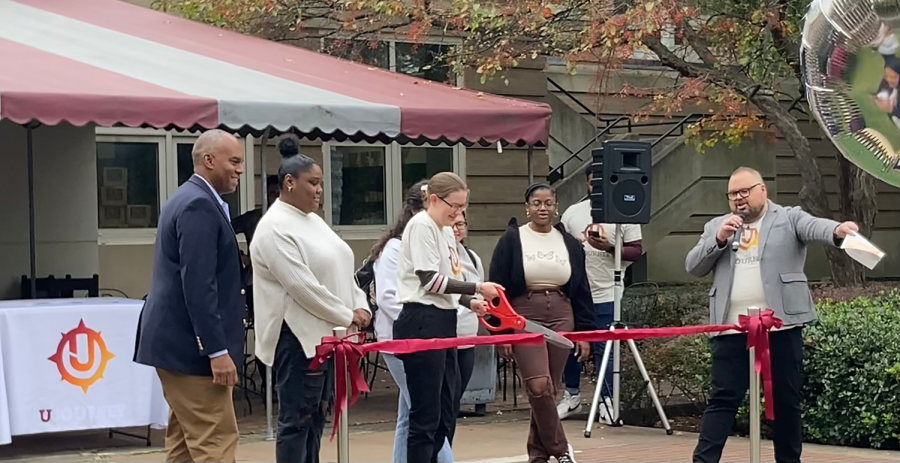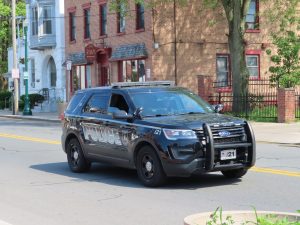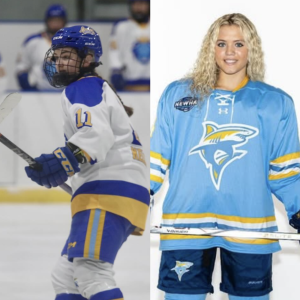New Residential Program, U-Journey, Launches
Student leaders inaugurate the new curriculum by cutting a ribbon with President Harris (far left) and Dean Keytack (far right) after speeches given by the President and Dean to introduce to plan.
October 13, 2022
On Wednesday, October 11 in Reamer’s Back Patio, Union College launched U Journey, Union’s new academic plan to integrate residential life and the school common core curriculum. Or, in the words of Ryan Keytack, Interim Vice President for Student Affairs & Dean of Students, U Journey can be described as “Our developmental, intentional and comprehensive plan for out-of-the-classroom learning[, involving] a robust suite of residential programming intentionally designed to nurture the whole individual.” U Journey is also meant to help “students develop life skills necessary to succeed in a complex global society.” Directors and officials from several department offices were present at the event to represent their work on the plan. U Journey events began this term with an experience for first-years focusing on introductions to Union and Schenectady, as well as with West Wednesdays, in which campus offices, staff and student groups are present at West to inform students about their organizations through handouts and socializing. Future West Wednesday themes will involve “living in community, discovering Schenectady, the social scene at Union, decision making regarding relationships, sustainability green efforts, [and] a whole host of things”, according to Keytack. U Journey will prioritize different community- and career-oriented experiences for students of each class, and will “continue to expand its reach to all students in the coming years”, according to its webpage.
According to Dean Keytack, U Journey is in the process of “testing [to] see what works,” after which Union will “make adjustments and build from there.” Director of Residential Life Amanda Iverson also says that in addition to Union’s own research, the school is looking to assess student feedback, weighing what students want to see in the plan and what they think they need. According to Iverson, this will guide the development of U Journey’s overall curriculum. “My hopes and my dreams for this experience”, according to Keytack, are “to find what makes the most sense for Union and to make it[…] what I’m gonna call serious fun. There’s learning, but it’s also community development, engagement, etc..” Speaking at the event, Keytack outlined U Journey’s focal areas: well-being, life skills, decision making, cross-cultural competency, belonging and reflection. He describes the program as a “residential renaissance[…] in residence halls but also in our houses, our apartments, in the Minervas, in our greek houses, on our fields, on our courts, off campus, in Schenectady. That’s the learning environment that we get to draw upon.”
Keytack said that U Journey began with the idea of its framework: “the idea of meeting students where they’re at along their journey, at move-in, orientation, first-year experience, second-year experience, upperclass experience.” According to Keytack, the plan is the result of “years of institutional feedback” partly based on “student development theory” and “some focus groups from last year”.
Keytack emphasized the importance of “informal relationships that happen outside the classroom” with U Journey.” He noted “opportunities to think about the role of faculty, staff and students interacting outside the classroom[and] sharing their story” to create connections with each other. Aspects of U Journey at the college-wide level will include traditional events and programming, and also might involve “passive programming, displays, social media campaigns[…] workshops[… and] space for dialogue.” As Keytack works on how to “formalize student leadership related to the U Journey,” students should also look out for “an announcement about student internships”. This will rely largely on Residential Life “so that learning and experience happen in the Minervas, in the fraternity and sorority houses, in the residential settings.” U Journey will look for student leaders “who will do event planning, but also represent various facets of campus.”
Director of Residential Life Amanda Iverson says that Residential Life was “very involved” in forming U Journey, especially through the Corps of Campus and Community Living and Learning (C2L2), which Iverson called the “driving advisory force behind U Journey.” C2L2, currently with about a dozen members including Keytack, joins members of the Office of Residential Life, Office of Fraternity and Sorority Life, the Minerva Programs Office, and the Office of Community Standards. As U Journey develops, Iverson also says that people will notice the programs of Residential Advisors “start to fit within a framework” with “more intent behind our programs.” These programs will include “intentional programming efforts by RAs to get [students] connected to other events and offices on campus”, such as “professionally-driven” talks to help students learn about campus resources. Students should also expect more cohesion among the programs of residential halls, Minervas and greek life.
Roger Woolsey, Becker Career Center’s Executive Director, says that later this term, Union should also expect the launch of U Ready, Becker’s curriculum within U Journey. U Ready is “a two-year career readiness curriculum that we have designed to better prepare students within those first two years while they’re here at Union.” Woolsey expects it “to increase student engagement by about 70 or 80%.” U Ready will lead “students to the resources we have that are pertinent[…] to where they are in school.” A key goal of this curriculum is reducing uncertainty: “The objective is to have students become a lot more confident by the end of their sophomore year as to sort of what it is that they want to do; where they want to be in their career.” To this end, U Ready will have a sequence of “success steps” for students, of which there will be about three to five a term. “First term, first year, [students] will go to Handshake [and] complete their profile”, says Woolsey. “They do a self-assessment inventory [and] find out a little bit more about who they are [and] what their skill sets are. They meet with a career advisor and they also establish their first or draft their first Union résumé.” In a student’s second term, they will establish a LinkedIn profile and find a mentor on the Union Career Alumni Network. Each step is intended to take 15–45 minutes. Woolsey also noted upcoming U Ready events such as the Engineering and Tech Symposium on October 21, as well as the upcoming Union Financial Network Finance Boot Camp. Other future events will focus on health and legal services, as well as the postgraduate experiences of athletes.
During his speech at the event, President Harris noted what graduates took away from time at Union, citing many valued aspects from faculty, athletics, greek life or clubs. He added that some sometimes he hears regret from students, such as: “‘There’s a lot of lessons I had to learn, but sadly, it wasn’t till my junior year, or senior year, or even worse, after I graduated, that I appreciated all the places at Union I could prepare to be a successful adult after Union.” “What U Journey is about,” said Harris, is that “you have to be as intentional outside the classroom as we are inside the classroom. You oughta have goals for your major, for gen ed; we should also have goals outside the classroom, in key areas.”







